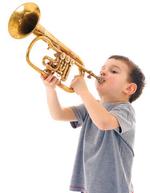Snapshots
Nuggets of research, policy, and practice to keep you informed Principal, September/October 2016
Nuggets of research, policy, and practice to keep you informed
Principal, September/October 2016
RESEARCH REPORT: Music Instruction Impacts Cognitive Development
 Advocates for the arts in schools claim that music makes a difference in students’ academic and personal growth. But what does the research really tell us? Scientists at the University of Southern California (USC) are trying to find out. Early results of their study show that learning to play music can significantly affect children’s brain development during the elementary school years.
Advocates for the arts in schools claim that music makes a difference in students’ academic and personal growth. But what does the research really tell us? Scientists at the University of Southern California (USC) are trying to find out. Early results of their study show that learning to play music can significantly affect children’s brain development during the elementary school years.
Early findings show that children’s knowledge builds over time, based on the experiences they’ve had along the way. Researchers contend that the sharper students become, the more they can learn.
“We say that when people are inspired, they create, that it all comes in a rush,” USC neuroscientist and author Antonio R. Damasio told Education Week as the study was beginning. “That moment of inspiration generally comes on the back of a whole process of imagination and knowledge and criticism of what has come before.”
In other words, there are signs that children’s brain structure develops better when exposed to training in music.
Other studies have shown possible links between musical training in early childhood and structural changes in the brain, but researchers contend this study will provide more insights.
 The USC study is following several dozen children, mostly from low-income and bilingual families in Los Angeles. The participating children were 6 and 7 when a portion of them began to participate in the heralded El Sistema music instruction program that started in Venezuela and has gone global.
The USC study is following several dozen children, mostly from low-income and bilingual families in Los Angeles. The participating children were 6 and 7 when a portion of them began to participate in the heralded El Sistema music instruction program that started in Venezuela and has gone global.
The L.A. Philharmonic’s Youth Orchestra Los Angeles, the Heart of Los Angeles community center, and two elementary schools are partnering in the study. The children get free instruments and intensive training from adult musicians, and occasionally have MRIs or other tests to measure brain activity.
Early findings of the USC study published in the February 2016 issue of Frontiers in Psychology show that children exposed to music instruction for two years are more able than their peers to identify changes in musical pitch on the piano and have developed more “auditory pathways” than their peers.
Why does this matter?
Auditory processing is linked to the development of speech and language, according to USC’s Brain and Creativity Institute.
“Our findings demonstrate that music education has an important role to play in childhood development and add to the converging evidence that music training is capable of shaping skills that are ingredients of success in social and academic development,” the researchers wrote in their journal article. “It is of particular importance that we show these effects in children from disadvantaged backgrounds.”
Earlier studies also suggest that music instruction can help children’s brains develop. This growing body of evidence could build an even stronger case that children in all communities can benefit tremendously from exposure and instruction in strong music programs.
It signals a challenge for many principals and schools: how to provide children with this opportunity to thrive, whether at school or with partners in the community.
ESSAspeak: Consultative Process
The Every Student Succeeds Act (ESSA) presents an opportunity to create more effective education policies by ensuring that parents, educators, and other leaders are all at the table to develop state and local policies and practices.
The consultative process requires states and communities to convene discussions before drafting plans that reflect a shared vision. But what does it mean to properly consult with stakeholders? Here are a few guiding principles:
Stakeholders participating in the process should be representatives of those named in the law.
This stakeholders group should initially convene to define how the consultative process will be
designed and the desired outcomes.
The process should then:
- Be based on affirmative interactions between colleagues;
- Produce collaborative discussions, which should include goal-setting guiding principles;
- Be sustained, with stakeholders participating in discussions
- at the decision-making, implementation, and evaluation stages; and
- Be transparent and open to the public.
If the consultative process has not been initiated, or is stalled, a stakeholder can initiate (or re-initiate) the process. Principals should be proactive in taking part in the process and ensuring that school leaders’ voices are heard. For more information about these guidelines for the consultative process, visit www.learningfirst.org.
Copyright © National Association of Elementary School Principals. No part of the articles in NAESP magazines, newsletters, or website may be reproduced in any medium without the permission of the National Association of Elementary School Principals. For more information, view NAESP’s reprint policy.

